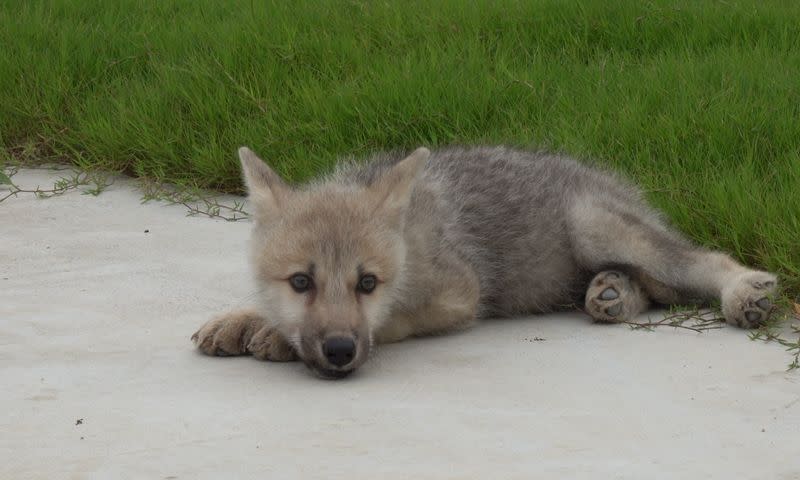A Beagle Just Gave Birth to the First Cloned Arctic Wolf Pup (Her Name Is Maya, and She’s Adorable)

The first successful cloned Arctic wolf, Maya, was born to a beagle in a Beijing lab on June 10. The company, Sinogene, made the announcement on September 19.
Sinogene researchers used donor cells from a wild female Arctic wolf to construct 137 new embryos from canine oocytes (developing eggs), which they then implanted in seven beagles.
The cloned wolf is expected to live at the arctic-themed park Harbin Polarland and be shown to the public.
A clone of a Canadian Arctic wolf now lives with its surrogate mom, a beagle dog, in a Chinese lab known for cloning pets. The cloned wolf pup, named Maya, was born on June 10 and will eventually move into an arctic-themed park in China called Harbin Polarland, to be shown off to the public.
Sinogene Biotechnology of Beijing, showed off the cloned Arctic wolf pup via video on September 19. The company—known for cloning mostly dogs, cats, and horses—highlighted the process of taking donor cells from a wild female Arctic wolf.
“To save the endangered animal, we started the research cooperation with Harbin Polarland on cloning the arctic wolf in 2020,” said Mi Jidong, Sinogene general manager, in a press conference, according to Global Times. “After two years of painstaking efforts, the Arctic wolf was cloned successfully. It is the first case of its kind in the world.”
The Arctic wolf is a subspecies of the grey wolf, and despite statements by Sinogene and Global Times, it is not considered an endangered species by the International Union for Conservation of Nature.
Using cells from the donor wolf’s skin sample, researchers took oocytes (developing eggs) from a female dog and constructed 137 new embryos. The team transferred 85 embryos into the uterus of seven different beagles. Only one healthy wolf has been born so far. The donor wolf, also named Maya, was brought from Canada to China in 2006; she died in 2021.
“We decumuli and enucleate the oocyte, and then inject the donor cell into the periovular space of the enucleated oocyte, and the somatic nucleus and the enucleated oocyte reconstitute into a new embryo,” says Zhao Jianping, Sinogene vice president, in a press release. “Then we transfer activated cloned embryos into the uterus of the beagle to fertilize it, and the beagle gave birth to a healthy Arctic wolf pup.”
The early success of the cloned Arctic wolf has led Sinogene and the Beijing Wildlife Park to agree to a partnership, “to jointly help rare and endangered animals breed more effectively, use advanced biotechnology more effectively, and realize the goals of resource protection on a wider scale,” according to the press release—in part by continuing using cloning technology. The two groups didn’t offer up details on which animals would be cloned next.

Maya still lives in the Sinogene lab with her beagle surrogate mother, but Harbin Polarland plans to eventually bring her to its park. Unsure about the ability to introduce Maya to original Arctic wolf groups, Harbin Polarland expects to have Maya live alone, at least at first.
This may be the first Arctic wolf to be cloned, but it’s not the first mammal. Cloning animals has been going on for over two decades, ever since the 1996 cloning of Dolly the sheep. Since that time, multiple animal species have been cloned, and private firms have opened for everything from pet cloning to wild animal cloning.
While cloning a pet has become part of our culture, albeit a fraction of it, cloning humans hasn’t happened. The reasons vary from the ethics to the process to the lack of purpose. As Hank Greely, a professor of law and genetics at Stanford University, told Live Science: “I think there is no good reason to make [human] clones.” Cloning doesn’t produce an exact replica of a person’s way of thinking and mind, simply a genetic makeup. And the risks abound. There’s been no compelling reason to overcome the ethical risks, both socially and physically. Beyond the obvious ethical discussion of crafting humans comes the inherent risks that cloning mammals have shown us, with high rates of death, abnormalities, and disease.
Sinogene also told Global Times that a second cloned Arctic wolf pup was expected to be born on September 22, though the company has not yet announced if it was a success.
You Might Also Like

 Yahoo Movies
Yahoo Movies 